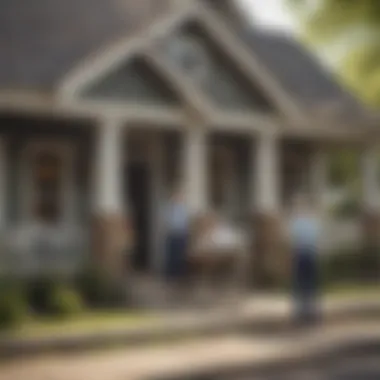Understanding Reverse Mortgage Home Repairs: Insights for Homeowners


Intro
Understanding how reverse mortgage funds can be used for home repairs provides a crucial tool for homeowners, especially seniors. It is a pocket of knowledge that offers depth around responsibilities and rights related to housing. This work aims to give a clear perspective on how utilizing such financial instruments can empower individuals to maintain and even enhance their property’s value through necessary repairs.
Understanding Loans
Homeowners often juggle their finances based on limited clear information about loans. A reverse mortgage is a unique finance type that stands different from regular loans, aiming primarily at the senior demographics. But firstly, it is essential to recognize how loans in general work.
Types of Loans
- Personal loans: Often unsecured, providing flexible financing for diverse purposes.
- Student loans: Typically used for educational funding with specific repayment options.
- Reverse mortgages: These require no regular payments until you sell the house, move out, or pass away.
Loan Eligibility Criteria
Qualifying for a reverse mortgage means meeting specific criteria. Moreover, borrowers usually must be at least 62 years old, have adequate home equity, and meet financial assessment standards, including income and creditworthiness.
Pros and Cons of Taking Out a Loan
Reverse mortgages may appear advantageous:
- No monthly mortgage payments required while you live in your home.
- Access to funds that can increase home livability and appeal.
However, discerning homeowners also should be aware of possible downsides:
- Interest can compound, which may erode home equity over time.
- The obligation to maintain the home using the inherited funds properlly.
Mortgage Essentials
Knowing the ins and outs of mortgages is paramount for any reverse mortgage conversation.
Overview of Types of Mortgages
Different scenarios apply to mortgages, ranging from fixed-rate to adjustable-rate mortgages (ARMs). Fixed-rate mortgages stay constant through the life of a loan, while ARMs might venture into variable rates, creating fluctuations in monthly payments.
Mortgage Application Process
Taking steps toward applying for a reverse mortgage can feel complex. Indeed, the process involves consulting various lenders, comparing rates, and gathering various personal financial documents to provide necessary information.
Home Affordability Calculations
Ascertaining whether one's property is affordable plays a crucial role in a successful home repair plan. Utilizing tools to determine property value helps establish realistic funding expectations.
Refinancing Insights
Even if taking out a reverse mortgage already signifies a considerable financial decision, there may arise moments to re-examine the initial arrangements vital for effective resource management.
Reasons to Refinance a Loan
Refinancing can be explored for several reasons such as:
- Rates may become favorable.
- Additional financial flexibility may become required.
Steps Involved in Refinancing
A systematic approach to refinancing encompasses:
- Analyzing the present loan against potential new arrangements.
- Preparing documentation anew.
- Closing on the preferred option.
How to Determine if Refinancing is Right for You
Is refinancing a necessary change? Homeowners must consider factors like current interest rates, the length of time they plan to remain in their home, and larger economic trends affecting property values.
Navigating Credit Cards
For homeowners in need of home improvement financing, understanding credit card options is trickier but vital.
Types of Credit Cards
Many varieties exist, including rewards, cashback, and low-interest cards suitable for different spending habits.


Credit Card Utilization Tips
Effective use of credit cards may stabilize finances. Strategies include using less than 30% of credit limits, making payments on time, or utilizing alerts.
Avoiding Common Credit Card Pitfalls
Not being aware of fees associated can lead quickly to financial trouble. Ignoring terms assumes clear knowledge, which may not be true.
Protecting with Insurance
Though lesser cherished, protection through various types of insurance often happens over times of repair and renovation.
Importance of Different Insurance Types
It is smart for homeowners to budget towards homeowners insurance, health insurance, and other policies relevant for containing financial risk.
Shopping for Insurance Policies
Comparing policies assists homeowners in locating terms fitting their unique situations.
Understanding Insurance Premiums and Deductibles
Clear knowledge of what one can expect in relation to premiums and deductibles creates deeper insurance awareness for household risk management.
Engaging with these financial avenues, especially around reverse mortgage funding, paves the way unfair pathways towards improving property conditions. Are homeowners ready to take calculated steps forwards? It starts with informed understanding.
Prelims to Reverse Mortgages
Exploring reverse mortgages is vital for homeowners seeking financial flexibility. This section aims to shed light on fundamental concepts, its meanings, and all necessary eligibility criteria involved. With many retirees living on fixed incomes, reverse mortgages offer an appealing option. They allow homeowners to unlock equity in their property while remaining occupants.
Definition and Purpose
Reverse mortgages are specialized loans designed for homeowners, typically aged over 62. They facilitate the access of home equity as liquid cash without necessitating monthly payments. Instead of the borrower paying the lender, the opposite occurs—the lender essentially pays the homeowner. This arrangement serves primarily to assist in resolving financial needs during retirement, such as healthcare expenses or augmenting monthly income. A reverse mortgage does not require income verification, hence, it is tailored for seniors who might face obstacles securing traditional loans.
The purpose is clear: make the fund easily available for the essential aspects of life. As long as the homeowners maintain up-to-date on property taxes and insurances, they can reside in the property until they move out, sell the home, or pass away.
Eligibility Criteria
Eligibility to obtain a reverse mortgage includes specific parameters. Homeowners must meet the following criteria:
- Age Requirement: Borrowers must be 62 years or older.
- Ownership Stakes: Homeowners must maintain significant equity in their property, often eightly percent or higher.
- Primary Residence: The property must be the primary living residence of the homeowner.
- Credit Evaluation: Although traditional credit scores may not factor heavily, the lender may check financial history. Those with outstanding debts could face lender reconsiderations.
In fulfilling these qualifications, prospective borrowers pave the way for qualified funding and make steps toward enhancing their financial situation efficiently.
The Importance of Home Repairs
Home repairs play a crucial role in maintaining and enhancing the value of a property. Neglecting these essential tasks can lead to more significant issues and substantial financial implications. In the context of reverse mortgages, understanding the importance of home repairs becomes even more pronounced. There is a compelling interplay between the condition of one's home and the viability to use a reverse mortgage effectively.
Firstly, making timely and necessary home repairs ensures the property remains in good condition. Not just aesthetically but structurally, properties that are not well-maintained might face increasing costs down the road. Imagine a roof drip. If left untreated, it could cause extensive water damage, swelling repair costs significantly over time. Thus, regular maintenance contributes to the sustainability, which is the backbone of property investment.
Second, there are numerous benefits associated with keeping your home repair needs addressed. Maintaining a home positively impacts property value. It’s not just that homeowners want their homes to look good; potential buyers assess property condition seriously when making purchase considerations.
Home repair is critical to prevent further damage and to maintain home value.
Furthermore, owners considering reverse mortgages must understand that lending institutions will assess the home’s current condition. Financing home repairs through reverse mortgages allows senior homeowners to leverage their home equity. Proper usage reflects knowledge and tact.
Lastly, recognizing the immediacy of repairs through attention leads to long-term benefits. Regularly checking for damage not only ensures a home's aesthetic but also addresses hidden problems. In picking a proactive stance, families can secure their futures against unpredictable difficulties associated with poor home maintenance.
Evaluating home repairs from this perspective underscores an oft-overlook promise—security and sustainability through intelligent investment.
Impact on Property Value
The relationship between home repairs and property value is significant. Well-maintained homes usually appreciate not only in market readiness but in monetary worth. Enhancements can wage influence over attracting prospective buyers.
Consider the loose doorknob or chipped paint; crucial visuals establish immediate assessments of a property. Curb appeal in a great way elevates overall property stature. Hence, homeowners looking to maximize dual websites, personal enjoyment and future returns should emphasize repairing neglected elements promptly.
One aspect homeowners overlook is how they can gather accurate repair valuation metrics, reflecting practical market responses to ongoing maintenance decisions. Loose fittings tally; it sends the wrong message and reduces acceptability in negotiations.
In mundane terms:
- Good design leads to admiration.
- Malfunction leads to resistance.


Consequently, paying particular attention to first impressions significantly impacts how much prospective buyers offer. This not only uplifts financial value but enhances pride among homeowners as well.
Safety Considerations
Safety in a household should never be an afterthought. Perhaps even more than value, addressing home repair needs is fundamental from both human safety and comfort standpoints. The structural integrity of essential elements such as plumbing, electrical systems, and roofs must be priority concerns.
Homeowners must approach safety considerations diligently. Minor flaws can escalate into severe risks. For example, a rotting beam could result in a structural failure, endangering its residents. The assessment should include strengths and weakness of oil; a leaking roof can compound health safety issues raising mold concerns.
One tool helpful for establishing accountability can be scheduling regular inspections evaluating thorough checklists with actionable tips to address vulnerabilities swiftly.
By navigating these potholes proactively, owners reinforce safer environments. This reliability not only protects individuals' health but also secures emotional wellbeing one's home generates.
Thus, understanding the importance of home repairs ensures personal comfort and financial sense live hand in hand, fundamentally merging ownership responsibility with value generation in richer ways.
Using Reverse Mortgages for Home Repairs
Using reverse mortgages for home repairs is an important topic for many homeowners who need to maintain the value of their property. Understanding the connection between reverse mortgages and home repairs can empower homeowners to make informed decisions about their financial future. Home repairs can be a significant burden, especially when funds are tight, and a reverse mortgage can help alleviate some of that stress.
Accessing Funds
Homeowners can access funds from a reverse mortgage through multiple methods. The details of how these funds are distributed can make a big difference in a homeowner's choice. Typically, a line of credit is available, which allows property owners to withdraw funds as needed. There is also the option for a lump-sum disbursement or scheduled monthly payments. Each method has its own advantages. The line of credit approach is particularly appealing because it gives the homeowner flexibility to utilize the funds for repair needs as they arise while only paying interest on the amount that is $used.
In addition to flexibility, a reverse mortgage's non-repayment clause until the homeowner moves out or sells the house can provide significant peace of mind. Homeowners should ensure they lodge all necessary documents promptly to expedite fund access. Payments often get disbursed faster when homeowners provide complete and accurate information.
Types of Repairs Covered
Funding through a reverse mortgage is not limited to cosmetic changes. It can cover various vital repairs that affect the safety and functionality of a home. Common examples include:
- Roof Repairs: Necessary to prevent water damage and structural issues.
- Electrical Updates: Important for ensuring safety and compliance with current codes.
- Plumbing Work: Essential for functionality and damage prevention.
- HVAC System Replacement: Critical for proper heating and cooling, which can impact overall health and comfort.
Specific lending institutions may provide detailed guidelines on which repairs qualify for funding. Understanding these parameters allows homeowners to prioritize what improvements are most suitable for their homes.
Approval Process for Repairs
The approval process for using reverse mortgage funds for repairs can seem convoluted. Initially, homeowners should notify their loan servicer about the repairs required and how they plan to finance them. Documentation of the repairs, including quotes and project timelines, typically needs to be submitted for evaluation.
Once the servicer reviews this information, they assess approval based on criteria specific to their policies. Keep in mind that some lenders may impose restrictions on entire categories of repairs. Homeowners may also need to provide evidence that the repairs enhance the property's value. Engaging reliable contractors can facilitate smoother communication throughout this process, as they can assist with necessary documentation and project specifications.
Ensuring that all paperwork is well-organized helps to streamline what can sometimes be a lengthy approval process. Plan for enough time to secure the funds necessary to begin repairs, which may allow homeowners to avoid last-minute issues causing stress.
Key Takeaway: Understanding the methods to access funds and what repairs are eligible can significantly ease the burden of financing necessary home repairs through reverse mortgages.
Financial Implications of Reverse Mortgages
Understanding the financial implications of reverse mortgages is crucial for homeowners considering this financing option for home repairs. These mortgages allow homeowners aged 62 and above to convert their home equity into cash, helping to cover necessary repairs. While reverse mortgages can provide immediate financial relief, they also come with costs that must be carefully evaluated.
Costs and Fees Involved
When taking out a reverse mortgage for home repairs, several costs and fees may be incurred. Homeowners need to fully comprehend these aspects to avoid unforeseen financial stress down the line. Key expenses include:
- Origination Fees: This is the fee charged by the lender for processing the loan application, which can be a percentage of the home's value.
- Closing Costs: Expenses related to finalizing the mortgage documentation and transactions usually include title insurance, appraisal fees, and other processing charges.
- Mortgage Insurance Premiums: Borrowers are often required to pay insurance premiums for protection against the risks associated with a reverse mortgage.
- Servicing Fees: Lenders may charge fees for ongoing management and servicing of the loan, adding to the total costs.
It is essential for homeowners to obtain a detailed breakdown of these costs before proceeding. Engaging with a financial advisor can also facilitate better understanding and planning regarding these fees.
Quote: "Costs associated with reverse mortgages vary, so ensure thorough research is done beforehand to factor these into the decision-making process."
Impact on Heirs and Estate Planning
Reverse mortgages can significantly affect heirs and the overall estate planning for homeowners. Firstly, borrowing against home equity ensures that the estate's total value decreases. Once the homeowner passes away or moves out, the reverse mortgage must be repaid, typically through the sale of the home. Thus, the property value left for heirs may deflate after such repairs, depending on how funds were utilized and overall home appreciation. Key points to consider include:
- Elimination of Inheritance: If the reverse mortgage balance exceeds the home's value, heirs have limited et options; they cannot inherit debt that surpasses their estate value.
- Requirement for Sale: Most heirs might choose or need to sell the house to pay off the remaining mortgage balance, hence losing any direct ownership.
- Estate Planning Considerations: Throughout reverse mortgage utilization, a homeowner should examine their broader estate plan to avoid unforeseen stress placed on heirs after one's passing.
It is vital for homeowners entering a reverse mortgage agreeement to consult an estate planning lawyer to ensure their wishes regarding real estate and assets are thoughtfully aligned. By proactively planning for these implications, homeowners can contribute to a more harmonious transition for their heirs while maximizing home value.
Comparing Financing Options for Home Repairs
When it comes to maintaining and improving one's home, selecting an appropriate financing method is critical. Different financing options can significantly affect not only the homeowner's immediate costs but also their long term financial health. Understanding these options allows homeowners to make gui-led decisions tailored to their unique situations.
Reverse Mortgage vs.


Traditional Loans
Reverse mortgages and traditional loans serve different purposes and clientele. Reverse mortgages al-low seniors to access home equity without monthly payments, while traditional loans require regular repayments based on your credit history and financial status.
- Reverse Mortgages offer the benefit of not having monthly mortgage payments, and the loan is repaid when the borrower sells the home, moves out, or passes away. However, accrued interest can lead to a substantial overall amount due over time.
- Traditional Loans, such as home equity loans or lines of credit, necessitate monthly payments. This option can be more fiscally manageable for those who have regular income. They usually come with fixed interest rates, making budgeting more straightforward.
Both options require consideration of interest rates, eligibility, and potential effects on heirs and overall estate value. The choice leans heavily on individual financial circumstances.
Cost-Effectiveness of Reverse Mortgages
Cost-effectiveness in financing home repairs depends on several nuances. Reverse mortgages can seem an appealing choice, especially for seniors needing immediate cash. They allow for larger repair projects, which could enhance property value.
Some points to consider include:
- Fees and Costs: Reverse mortgages often involve higher upfront fees, including closing costs. It's essential to assess whether continuing to accrue interest on these costs makes sense for the long term.
- Access to Cash: Using a reverse mortgage for home repairs can sustain or elevate home value, accordingly, promoting the home's overall marketability and helping maintain independence in one's living situation.
- Long-term Stability: Payments are deferred as long as the homeowner lives in the house, making reverse mortgages cost-effective in the regard of cash flow. However, a detailed analysis of potential future equity loss must be assessed.
Ultimately, homeowners should weigh their financial situations alongside the immediate need for home improvements. Always consult with financial professionals for tailored advice.
Potential Risks Associated with Reverse Mortgages
Understanding the potential risks related to reverse mortgages is crucial for homeowners contemplating this option for financing home repairs. While reverse mortgages can provide necessary funds, they can also introduce uncertainties that may impact financial security and homeownership.
Market Fluctuations and Home Value
Home values do not stay fixed. They can soar or decline based on numerous factors such as economic conditions and local market trends. With a reverse mortgage, the loan amount is secured against the home’s value, leaving the remaining equity available to the homeowner.
However, if the property experiences market fluctuations, the value could decrease significantly. This drop can create issues, particularly when homeowners want to sell or refinance in the future. An anticipated market crash could deplete home equity and generate greater debt obligations due to the accrued interest that takes a toll on total equity accumulated.
Loan Repayment Obligations
Loan repayment in a reverse mortgage is not like traditional mortgages. The borrow is not required to make monthly payments, which might sound beneficial. Yet, this advantage hides a risk. The entire loan amount, plus interest, is due when the homeowner passes away, sells the home, or moves out. This condition can put increased burden on heirs who may have to sell the family home to clear the debt.
The outcome can sometimes leave heirs with limited choices, especially if market conditions have depreciated property value. Also, accumulative interest over time can result in a much higher loan balance than expected. Homeowners may find themselves face with having loan obligations they underestimated, thus reducing the ultimate financial legacies planned for their heirs.
"Reverse mortgaging can provide cash providing repairs. However, condition of the housing market must be thought cardinally."
In summary, while reverse mortgages can serve as financial lifelines, potential market fluctuations and repayment obligations are elements to consider carefully. Homeowners should educate themselves about these risks prior to committing to reverse mortgages and securing funds for home repairs.
Best Practices for Home Repair Financing
Effective home repair financing is crucial for homeowners considering reverse mortgages. Understanding best practices not only prepares you for necessary repairs but also ensures optimal usage of financial resources. Leveraging a reverse mortgage for this purpose requires a strategic approach. The right practices enhance the value of your property while minimizing risks.
Assessing Repair Needs
Evaluating which repairs are necessary involves a systematic examination of your home. Start with a thorough inspection of the property's interior and exterior. This includes checking the roof, plumbing, electrical systems, and structural integrity. Prioritize repairs that risk safety or significantly decrease property value. It is prudent to document these repairs systematically. Making a list helps clarify both immediate and long-term repairs.
Remember: Not all repairs are created equal. Some even might be more beneficial for long-term property appreciation than generic fixes.
Additionally, obtaining multiple estimates from contractors gives insight into pricing and scope of work. Understanding the market rates helps in budgeting better for repairs. Creating a timeline for when repairs should occur also aligns well with your financial planning.
Working with Contractors
Choosing the right contractor can be the difference between cost-effective and costly repairs. Do extensive background checks. Verify licenses and read reviews. It also helps to ask for recommendations from friends or family who may have similar past experiences with contractors. Ensuring they are reputable can help you avoid potential pitfalls.
When you’ve selected a contractor, be clear in communication. Define the scope of work in detail. It is often good practice to sign a written contract. This document should outline deadlines, payment schedules, and what happens if work does not comply with the expectations.
Payments often are made in installments; typically after certain milestones are achieved. This structure safeguards your investment and maintains incentives for professionalism.
Culmination
In summary, understanding how reverse mortgages can facilitate home repairs is crucial for homeowners seeking to maintain their property's value and livability. Proper maintenance of a home directly affects its market position, particularly for seniors contemplating using accumulated home equity. It enables them to tap into needed funds without monthly repayment schedules, thus providing financial leeway for essential improvements.
Summary of Key Points
Key discussion points throughout this article emphasize several factors:
- Access to financing: Reverse mortgages allow access to expensive repair costs
- Eligibility and processes: Homeowners should understand what repairs qualify under these funds
- Advantages of investment: Ensuring home repairs correlates to maintaining or improving property value, leading to better long-term outcomes for themselves and their heirs.
- Risks vs. rewards: Homeowners bear responsibility to evaluate the implications and weighing demands of both mortgage arrangements and potential repair bills.
Final Considerations for Homeowners
Homeowners considering reverse mortgage options for their repair finances should assess their situation quite clearly. Home repairs should not be overlooked, especially when linked to financial instruments as impactful as reverse mortgages.
Here are some closing thoughts:
- Explore Alternatives: Always research various financing methods before deciding.
- Seek Professional Advice: Consult with a trustworthy financial adviser to clarify views.
- Weigh Continuing Obligations: Remember that work secured could affect loans.
Ultimately, maintaining a property through strategic repairs and grants clarity in using finances responsibly, emphasizing not only quality of life but also wise estate planning.







